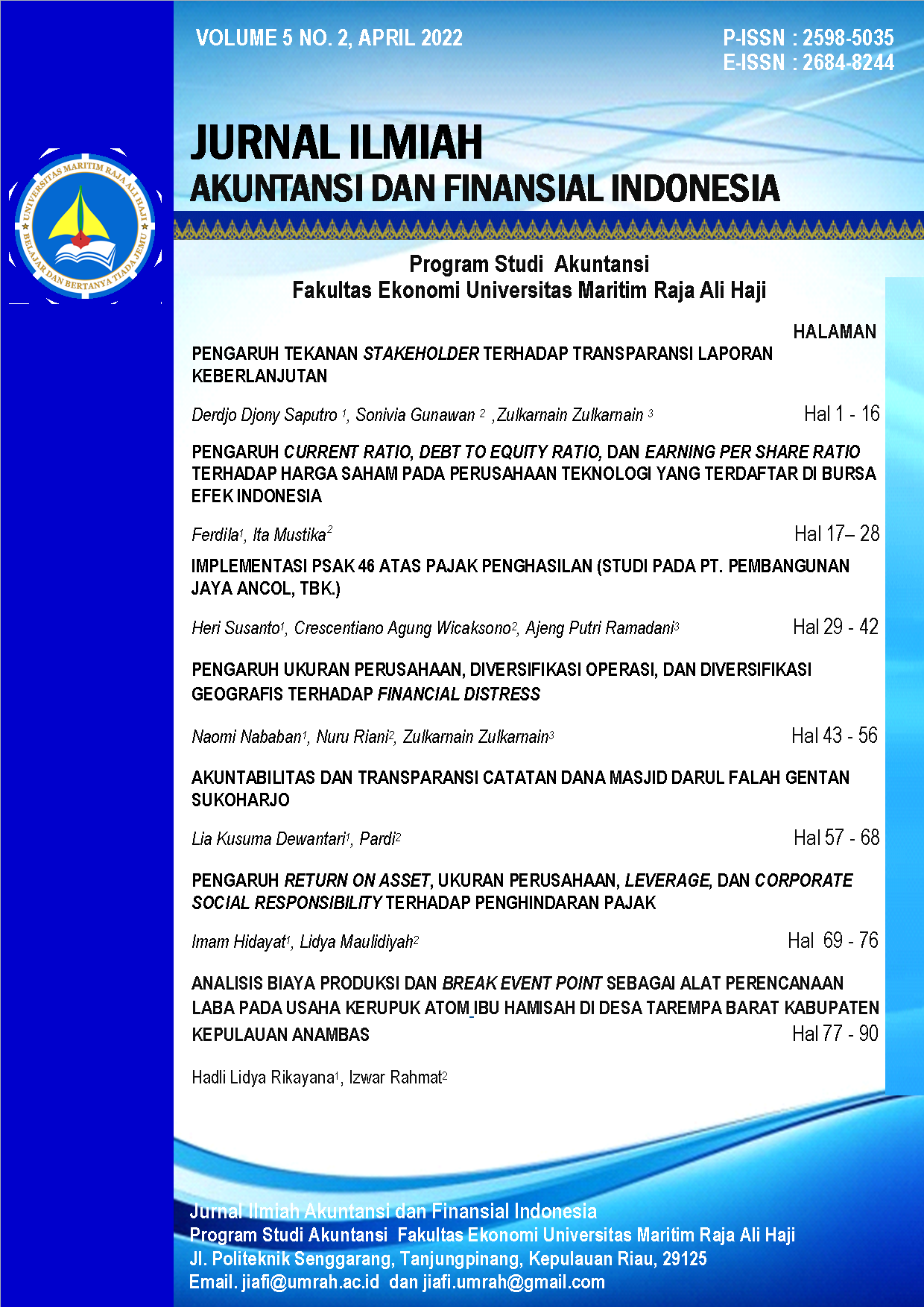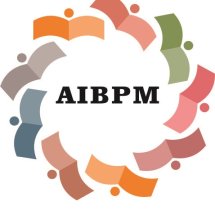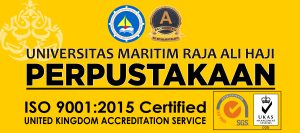Pengaruh Tekanan Stakeholder terhadap Transparansi Laporan Keberlanjutan
DOI:
https://doi.org/10.31629/jiafi.v5i2.4202Keywords:
stakeholder, stakeholder pressure, transparency of sustainability reportingAbstract
This study aims to examine the effect of stakeholder pressure on the transparency of sustainability reports. This study uses secondary data in the form of corporate sustainability reports contained in GRI for the 2016-2020 period. Based on the purposive sampling method, this study used 52 companies as samples. The independent variables in this study are stakeholder pressure from environmentally sensitive industries, industries close to consumers, investor-oriented industries and employee-oriented industries which are measured using a dummy variable. The dependent variable in this study is the transparency of the sustainability report, which was obtained using principal component analysis based on four factors, namely reporting frequency, application level, level statement, and assurance of sustainability report. The results show that the influence of stakeholder pressure on environmentally sensitive industries and employee-oriented industries has a negative effect on the transparency of sustainability reports. The pressure of industrial stakeholders close to consumers has a positive effect on the transparency of sustainability reports, while the pressure of investors-oriented industrial stakeholders has no effect on the transparency of sustainability reports.
Downloads
References
Alfaiz, D. R., & Aryati, T. (2019). Pengaruh Tekanan Stakeholder dan Kinerja Keuangan Terhadap Kualitas Sustainability Report dengan Komite Audit Sebagai Variabel Moderasi. Methosika: Jurnal Akuntansi Dan Keuangan Methodist, 2(2), 112–130.
Anderson, R. C., Mansi, S. A., & Reeb, D. M. (2003). Founding family ownership and the agency cost of debt. Journal of Financial Economics, 68(2), 263–285.
Asnawi, A. (2020). Nasib Warga Lakardowo, Satu Dasawarsa Hidup dengan Limbah Berbahaya. Mongabay.Co.Id/. https://www.mongabay.co.id/2020/10/25/nasib-warga-lakardowo-satu-dasawarsa-hidup-dengan-limbah-berbahaya-1/
Aziz, A. (2014). Analisis Pengaruh Good Corporate Governance (GCG) Terhadap Kualitas Pengungkapan Sustainability Report (Studi Empiris pada Perusahaan di Indonesia Periode Tahun 2011-2012). Jurnal Audit Dan Akuntansi Fakultas Ekonomi Universitas Tanjungpura, 3(2), 65–84.
Bushman, R. M., Piotroski, J. D., & Smith, A. J. (2004). What determines corporate transparency? Journal of Accounting Research, 42(2), 207–252.
Carroll, A. B. (1991). The pyramid of corporate social responsibility: Toward the moral management of organizational stakeholders. Business Horizons, 34(4), 39–48.
Dando, N., & Swift, T. (2003). Transparency and assurance minding the credibility gap. Journal of Business Ethics, 44(2), 195–200.
Deegan, C., & Gordon, B. (1996). A study of the environmental disclosure practices of Australian corporations. Accounting and Business Research, 26(3), 187–199.
Deegan, C., & Unerman, J. (2011). Unregulated corporate reporting decisions: considerations of systems-oriented theories. Financial Accounting Theory. London: McGraw-Hill.
Dubbink, W., Graafland, J., & Van Liedekerke, L. (2008). CSR, transparency and the role of intermediate organisations. Journal of Business Ethics, 82(2), 391–406.
Elkington, J., & Rowlands, I. H. (1999). Cannibals with forks: The triple bottom line of 21st century business. Alternatives Journal, 25(4), 42.
Fernandez-Feijoo, B., Romero, S., & Ruiz, S. (2014). Effect of stakeholders’ pressure on transparency of sustainability reports within the GRI framework. Journal of Business Ethics, 122(1), 53–63.
Fombrun, C. J., & Rindova, V. P. (2000). The road to transparency: Reputation management at Royal Dutch/Shell. The Expressive Organization, 7, 7–96.
Freeman, R. E. (2015). Stakeholder theory. Wiley Encyclopedia of Management, 1–6.
Gamerschlag, R., Möller, K., & Verbeeten, F. (2011). Determinants of voluntary CSR disclosure: empirical evidence from Germany. Review of Managerial Science, 5(2), 233–262.
Greenwood, M. (2007). Stakeholder engagement: Beyond the myth of corporate responsibility. Journal of Business Ethics, 74(4), 315–327.
Hamudiana, A., & Achmad, T. (2017). Pengaruh Tekanan Stakeholder Terhadap Transparansi Laporan Keberlanjutan Perusahaan-Perusahaan di Indonesia. Diponegoro Journal of Accounting, 6(4), 226–236.
Holder-Webb, L., Cohen, J. R., Nath, L., & Wood, D. (2009). The supply of corporate social responsibility disclosures among US firms. Journal of Business Ethics, 84(4), 497–527.
Huang, C.-L., & Kung, F.-H. (2010). Drivers of environmental disclosure and stakeholder expectation: Evidence from Taiwan. Journal of Business Ethics, 96(3), 435–451.
Jolliffe, I. T. (2002). Principal component analysis for special types of data. Springer.
Joseph, G. (2012). Ambiguous but tethered: An accounting basis for sustainability reporting. Critical Perspectives on Accounting, 23(2), 93–106.
Kaptein, M., & Van Tulder, R. (2017). Toward effective stakeholder dialogue. Business and Society Review.
KNKG. (2006). Pedoman Umum Good Corporate Governance Indonesia. Komite Nasional Kebijakan Governance.
McWilliams, A., & Siegel, D. (2001). Corporate social responsibility: A theory of the firm perspective. Academy of Management Review, 26(1), 117–127.
Rudyanto, A., & Siregar, S. V. (2016). Pengaruh Tekanan Pemangku Kepentingan dan Tata Kelola Perusahaan terhadap Kualitas Laporan Keberlanjutan. Simposium Nasional Akuntansi XIX, Lampung.
Rudyanto, A., & Siregar, S. V. (2018). The effect of stakeholder pressure and corporate governance on the sustainability report quality. International Journal of Ethics and Systems.
Sampaio, M. S., da Silva Gomes, S. M., Bruni, A. L., & Dias Filho, J. M. (2012). Evidenciação de informações socioambientais e isomorfismo: um estudo com mineradoras brasileiras. Revista Universo Contábil, 8(1), 105–122.
Sugiyono. (2017). Metode Penelitian Bisnis: Pendekatan Kuantitatif, Kualitatif, Kombinasi, dan R&D. Alfabeta.
Suharyani, R., Ulum, I., & Jati, A. W. (2019). Pengaruh Tekanan Stakeholder dan Corporate Governance terhadap Kualitas Sustainability Report. Jurnal Akademi Akuntansi, 2(1).
Sweeney, L., & Coughlan, J. (2008). Do different industries report corporate social responsibility differently? An investigation through the lens of stakeholder theory. Journal of Marketing Communications, 14(2), 113–124.
Tagesson, T., Blank, V., Broberg, P., & Collin, S. (2009). What explains the extent and content of social and environmental disclosures on corporate websites: a study of social and environmental reporting in Swedish listed corporations. Corporate Social Responsibility and Environmental Management, 16(6), 352–364.
Utara, V. I., Ilham, E., & Nasir, A. (2014). Pengaruh Karakteristik Perusahaan dan Corporate Governance terhadap Pengungkapan Sustainability Report pada Perusahaan LQ45 yang Terdaftar di BEI. Jurnal Ekonomi Universitas Riau, 22(01).
Williams, C. C. (2005). Trust diffusion: The effect of interpersonal trust on structure, function, and organizational transparency. Business & Society, 44(3), 357–368.








